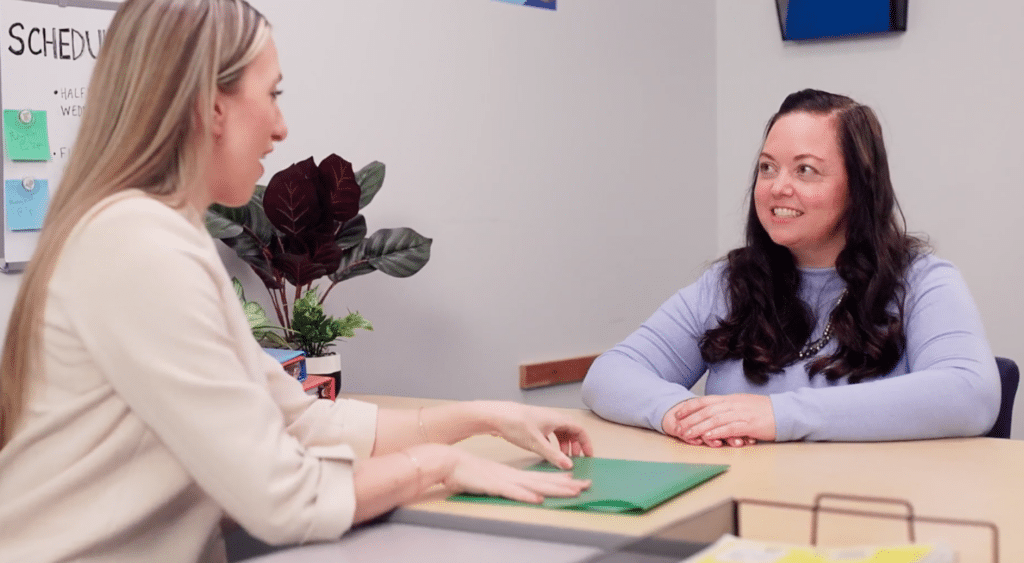How to become a substitute teacher in NC.

If you’re looking for a flexible career opportunity that positively impacts your community, consider substitute teaching. When you become a substitute teacher in North Carolina, you’ll gain invaluable experience while providing a vital service to students when their teachers are absent.
Kelly Education hires and manages thousands of substitute teachers for districts across the country—including North Carolina, so we’re experts in helping applicants understand each state’s substitute teacher requirements.
The NC Department of Public Instruction (DPI) does not require a professional educator’s license or special credentialing to substitute teach. However, there are a few state employment conditions that you must meet. And you should review the job description for the specific district where you’d like to work. Some schools set additional hiring requirements beyond the state.
Minimum North Carolina state requirements, at a glance*:
- Education: High school diploma or equivalent (some districts require some college coursework)
- Age: 18 years old
- Employment verification to work in the U.S.
- NC Health Certificate
- TB Test
- Background check
Kelly Education team members have additional hiring conditions as follows:
- Pre-hire training
- New hire orientation
A deeper dive into substitute teacher requirements.
As with most jobs, the hiring timeline can vary from a few days to a few weeks to complete. Your prompt attention and engagement are crucial to getting you into the classroom sooner.
Education verification.
The minimum education for substitute candidates in North Carolina is a high school diploma or equivalent. Contact your high school registrar’s office early to request official transcripts to avoid delays. Note that some districts require a certain number of college credits. If you’ve completed some college, request transcripts from your higher education institution(s) as well. Individuals with college credit may be eligible for a wider pool of jobs and potentially higher pay.
Employment verification.
Prospective substitute teachers must be eligible to work in the U.S. To verify your eligibility, you’ll submit a federal I-9 form with acceptable forms of identification. If working with a Kelly Education district partner, one of our recruiters will help you with this step.
Background check and fingerprinting.
North Carolina does require a state-mandated background screening. However, specific school districts may require more screenings, such as fingerprinting or drug screening.
Health screening.
North Carolina requires substitute teachers to submit a Health Certificate. This includes a medical screening, TB screening, and proof of vaccinations.
Training.
There is no state-mandated training for substitute teachers in North Carolina, but Kelly Education knows that professional preparation is vital to your success in the classroom. We require all substitute teacher applicants to complete a free, online ClassSmart training program. This unique training contains valuable content on best practices in the teaching profession and helps you build confidence in the field.
In addition to our pre-hire training, Kelly Education requires completion of a paid one-hour online New Hire Orientation. This valuable onboarding seminar covers Kelly Education and important district-specific policies and procedures.
Become a substitute teacher in NC with Kelly Education.
Kelly Education works with several North Carolina school districts to recruit and prepare top-notch substitute teachers. Ready to get started? Just fill out our interest form, and a Kelly Education recruiter will be in touch soon. Our team will answer your questions and facilitate the hiring process.
Are you ready to make a difference with flexible work that matters? Learn more about our substitute teacher jobs near you!
* Information subject to change. This is a general guideline. School districts may have more requirements, in addition to state requirements.

View Related: Article Job searching
You might like
Do substitute teachers get health benefits?
3 minute read
What a substitute teacher does.
4 minute read
Do substitute teachers get health benefits?
3 minute read
What a substitute teacher does.
4 minute read
Find your next job
Discover thousands of temporary, full-time, and remote jobs for beginning and experienced job seekers.


